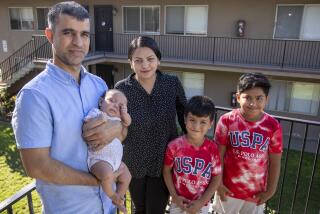Afghan Minority Revels in Power to Vote
- Share via
BAMIAN, Afghanistan — There is one main reason Sher Aga will not allow the Taliban to scuttle his chance to vote in the October presidential election.
Aga, an ethnic Hazara, recalled how agents of the former regime fatally shot his friends in this provincial capital’s bazaar.
“They really exploited us,” he said at a teashop in the market. “They killed a lot of our youth, burned our houses, destroyed the Buddhas and even released sheep and cattle into our fields to destroy our crops. Now it’s a good opportunity for us to elect someone to serve the country.
“I have a voter card, so now I have the power,” he said.
Aga’s comments are typical of the ethnic Hazara minority who live in the central Afghan province of Bamian. Armed with a new constitution that guarantees equal rights to minority groups, Hazaras are engaged in an intense campaign to grasp some power and lift themselves from the bottom of Afghan society.
The Hazaras have a great stake in seeing that the Taliban does not return to power. When the extremist Islamic movement controlled Afghanistan in the 1990s, its fighters killed hundreds -- by some estimates thousands -- of Hazaras in an effort to break the back of resistance to Taliban rule.
Now, the Hazaras’ efforts to maintain the peace before the election have helped make Bamian one of the safest areas of the country. On a recent day, university students played volleyball against the backdrop of the ruins of the Bamian Buddhas, destroyed by the Taliban in 2001.
Forty miles to the south, U.S.-led troops were hunting for Taliban and Al Qaeda supporters hiding in a network of caves.
The Hazaras, descendants of the Mongols who invaded Afghanistan with Genghis Khan, have refused to allow the violence that is rampant in other parts of the country to ruin their chance to participate in the landmark election.
Mohammed Mohaqiq, the first Hazara presidential candidate, said the new constitution had improved morale among Hazaras, who toil in the fields or do menial work in the cities. Mohaqiq is a former Cabinet member and a national figure, though it is unclear what kind of support he will get from non-Hazaras.
“Our history has been dark, and in the past 100 years we have been sold as slaves or killed because of who we are,” Mohaqiq said. “After centuries, we have the right to vote, and we will not be left out.”
Recently, Taliban fighters killed as many as 16 people in Oruzgan province, reportedly for carrying voter identity cards. Pushtun women have been told that they will be killed if they vote, and, in some areas, voter registration rates are as low as 15%.
But in Bamian province, with an estimated 140,000 eligible voters, the mullahs and local leaders are trying to boost the Hazara vote by encouraging women to get identification cards.
Hundreds of Afghans who lived in Iran are returning here and bringing a relatively liberal attitude.
At Bamian University, Zanaib Sajadi, 24, is among several female Afghan lecturers who have returned home from Iran. “We are here as a symbol of new Afghan women,” she said. “I came back because if I don’t participate in our elections, what will be the fate of our women? We are coming to rescue them.”
Thomas Mathew, the United Nations regional elections coordinator, said he had not received any threats against election workers. In three remote districts, teams of election workers traveled two days by donkey to register people to vote. Mathew compared the Hazaras’ interest in the election to the enthusiasm of the Dalits, the lower-caste “untouchables” in his native India.
Some Taliban and Al Qaeda supporters are living among the Pathan tribes in the southern part of Bamian province, but they do not have enough support from the Hazara population to carry out attacks locally, said Capt. Gavin Howse, commander of the quasi-military provincial reconstruction team run by New Zealand.
Two months ago, a local resident warned the team that a road its members frequently used would be mined. At least one suspect was arrested, and six mines were found.
“The elders came to us and apologized for their village,” he said. “They were embarrassed that someone from their village threatened us.”
Aga said he was looking forward to a government that would serve the country. He has a list of things that need to be done. “We want a government that will reconstruct the Buddhas, provide education, health centers, fix the roads. We want these things. All the men are ready to help build it.”
More to Read
Sign up for Essential California
The most important California stories and recommendations in your inbox every morning.
You may occasionally receive promotional content from the Los Angeles Times.










